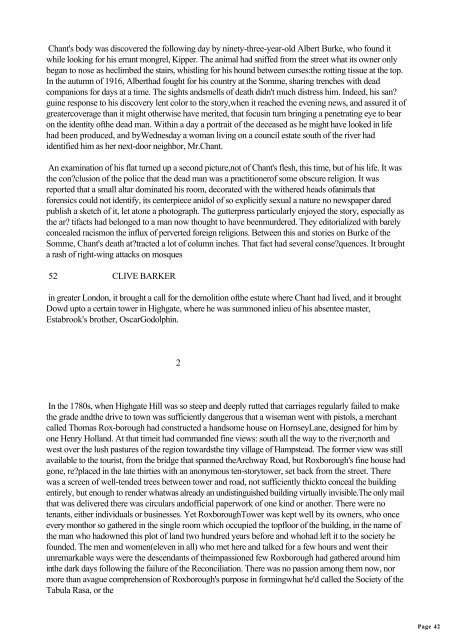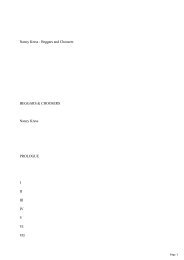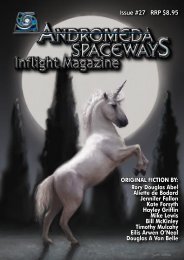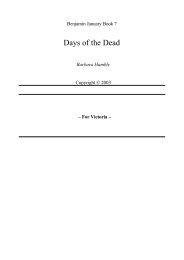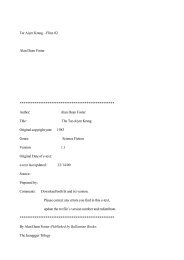Books by Clive Barker Galilee Forms of Heaven Sacrament ...
Books by Clive Barker Galilee Forms of Heaven Sacrament ...
Books by Clive Barker Galilee Forms of Heaven Sacrament ...
Create successful ePaper yourself
Turn your PDF publications into a flip-book with our unique Google optimized e-Paper software.
Chant's body was discovered the following day <strong>by</strong> ninety-three-year-old Albert Burke, who found it<br />
while looking for his errant mongrel, Kipper. The animal had sniffed from the street what its owner only<br />
began to nose as heclimbed the stairs, whistling for his hound between curses:the rotting tissue at the top.<br />
In the autumn <strong>of</strong> 1916, Alberthad fought for his country at the Somme, sharing trenches with dead<br />
companions for days at a time. The sights andsmells <strong>of</strong> death didn't much distress him. Indeed, his san?<br />
guine response to his discovery lent color to the story,when it reached the evening news, and assured it <strong>of</strong><br />
greatercoverage than it might otherwise have merited, that focusin turn bringing a penetrating eye to bear<br />
on the identity <strong>of</strong>the dead man. Within a day a portrait <strong>of</strong> the deceased as he might have looked in life<br />
had been produced, and <strong>by</strong>Wednesday a woman living on a council estate south <strong>of</strong> the river had<br />
identified him as her next-door neighbor, Mr.Chant.<br />
An examination <strong>of</strong> his flat turned up a second picture,not <strong>of</strong> Chant's flesh, this time, but <strong>of</strong> his life. It was<br />
the con?clusion <strong>of</strong> the police that the dead man was a practitioner<strong>of</strong> some obscure religion. It was<br />
reported that a small altar dominated his room, decorated with the withered heads <strong>of</strong>animals that<br />
forensics could not identify, its centerpiece anidol <strong>of</strong> so explicitly sexual a nature no newspaper dared<br />
publish a sketch <strong>of</strong> it, let atone a photograph. The gutterpress particularly enjoyed the story, especially as<br />
the ar? tifacts had belonged to a man now thought to have beenmurdered. They editorialized with barely<br />
concealed racismon the influx <strong>of</strong> perverted foreign religions. Between this and stories on Burke <strong>of</strong> the<br />
Somme, Chant's death at?tracted a lot <strong>of</strong> column inches. That fact had several conse?quences. It brought<br />
a rash <strong>of</strong> right-wing attacks on mosques<br />
52 CLIVE BARKER<br />
in greater London, it brought a call for the demolition <strong>of</strong>the estate where Chant had lived, and it brought<br />
Dowd upto a certain tower in Highgate, where he was summoned inlieu <strong>of</strong> his absentee master,<br />
Estabrook's brother, OscarGodolphin.<br />
2<br />
In the 1780s, when Highgate Hill was so steep and deeply rutted that carriages regularly failed to make<br />
the grade andthe drive to town was sufficiently dangerous that a wiseman went with pistols, a merchant<br />
called Thomas Rox-borough had constructed a handsome house on HornseyLane, designed for him <strong>by</strong><br />
one Henry Holland. At that timeit had commanded fine views: south all the way to the river;north and<br />
west over the lush pastures <strong>of</strong> the region towardsthe tiny village <strong>of</strong> Hampstead. The former view was still<br />
available to the tourist, from the bridge that spanned theArchway Road, but Roxborough's fine house had<br />
gone, re?placed in the late thirties with an anonymous ten-storytower, set back from the street. There<br />
was a screen <strong>of</strong> well-tended trees between tower and road, not sufficiently thickto conceal the building<br />
entirely, but enough to render whatwas already an undistinguished building virtually invisible.The only mail<br />
that was delivered there was circulars and<strong>of</strong>ficial paperwork <strong>of</strong> one kind or another. There were no<br />
tenants, either individuals or businesses. Yet RoxboroughTower was kept well <strong>by</strong> its owners, who once<br />
every monthor so gathered in the single room which occupied the topfloor <strong>of</strong> the building, in the name <strong>of</strong><br />
the man who hadowned this plot <strong>of</strong> land two hundred years before and whohad left it to the society he<br />
founded. The men and women(eleven in all) who met here and talked for a few hours and went their<br />
unremarkable ways were the descendants <strong>of</strong> theimpassioned few Roxborough had gathered around him<br />
inthe dark days following the failure <strong>of</strong> the Reconciliation. There was no passion among them now, nor<br />
more than avague comprehension <strong>of</strong> Roxborough's purpose in formingwhat he'd called the Society <strong>of</strong> the<br />
Tabula Rasa, or the<br />
Page 42


